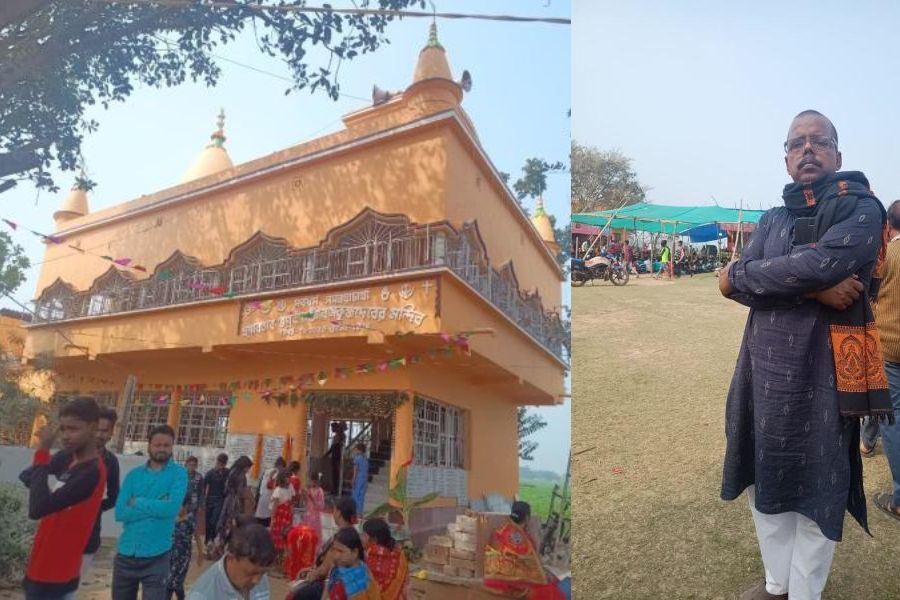A Muslim constable of Kolkata police has spent a large portion of his life’s savings to build a temple dedicated to Sri Ramakrishna Paramahansa because, he said, Ramakrishna did not differentiate between people based on their religions and believed in treating everyone as equal irrespective of caste or creed.
Abdul Kalam Khan has been instrumental in building the temple in his native village Bankhati in Bankura, 150km from Kolkata.
“It is not a mere temple where a puja will be held and then the doors will be shut. This temple will be dedicated to the service of the poor and destitute following the ideals Thakur (Sri Ramakrishna) propagated,” said Khan.
Contributing to building temples is not new in India. The rich and famous do that. And so do the ordinary faithful. But Kalam’s contribution stands out for the reason he chose to lend his support to a temple.
“I have always tried to follow the lessons of Thakur Sri Ramakrishna, who did not differentiate between people based on their religious identities and believed in treating everyone as equal irrespective of caste or creed,” said Khan.
The cost of building the temple was Rs 30 lakh. Khan alone contributed Rs 18 lakh and the rest was raised by residents of the area.
“I had Rs 22 lakh in my provident fund account that accrued over 26 years. I withdrew Rs 18 lakh from the account for the temple. A charitable clinic and a free coaching class will be run from a hall on the ground floor of the temple,” said Khan, who has served in various police stations across the city and the Jorabagan traffic guard in Kolkata.
The cop, who passed Madhyamik from Ramakrishna High School in Bankhati, has two daughters.
The elder one is pursuing a nursing course at KPC Medical College in Jadavpur and the younger has enrolled in a nursing course in Bangalore. His wife is a homemaker.
“My two daughters have taken loans from banks to pursue their courses. I could not support them as I had set my mind on contributing to the temple, which would be of help to the poor and the destitute,” said Khan.
What made him so dedicated to the cause of Sri Ramakrishna?
“We are so close to the birthplace of Thakur, who showed what a selfless life can be. This is the place that was graced by Sarada Devi, who urged all to love all equally. So we wanted to do something in our village which would be of help to others,” said Khan.
Kamarpukur, the birthplace of Sri Ramakrishna, is about 16km from Khan’s village. Jayrambati, where Sri Sarada Devi was born, is even closer.
Khan started Bankhati Sri Ramakrishna Sarada Sevashram in 2004 with the help of other residents. A temple to Sri Ramakrishna, which also offered free education, was built in 2008.
“But the structure weakened and not much could be done to restore it. About one-and-a-half years ago, we decided to dismantle the temple and build it afresh with two floors. The image of Ramakrishna will now be on the first floor and the ground floor will house a free coaching centre and a charitable dispensary,” he said.
Swami Ekavratananda, the secretary of Ramakrishna Mission Calcutta Students’ Home, Belgharia, who was present during the inauguration of the temple on Monday, said: “There are many people in the area from a disadvantaged background. They need to be provided with free education and health services. The temple will extend the service in a better way now.”
Upendranath Nandy, a teacher of chemistry at Scottish Church College, was among those who attended the inauguration. He said: “It is rare for a person to contribute such a large portion of his life’s savings to build a temple so charitable services can be offered. People like Abdul Kalam Khan are true disciples of Sri Ramakrishna and Swami Vivekananda.”
Before becoming a police constable, Khan worked as a porter during the construction of Vidyasagar Setu. He could not study beyond the secondary level because of poverty and had to take up odd jobs to sustain his family.
“I know the importance of education. It can give one a bright future. I want the temple to continue its mission of offering free education to those who cannot afford it because education alone can make a change,” said Khan.
